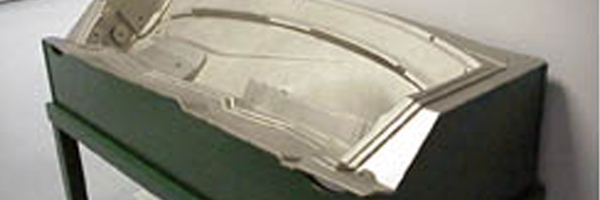New Technology & a Little Ingenuity Pay Off
Sometimes you don’t know how much better something can be until the right combination of circumstance, opportunity, and ingenuity click – and the light bulb goes on. Such was the case recently with the Nickel Tooling Technology division of Weber Manufacturing Limited.
Nickel shell used to create an automotive instrument panel. VERICUT’s Model Export was used to help create the casting blank faster and with fewer resources.
The company recently “discovered” how to create castings faster, easier, and more profitably. “As CAM technology improves, new approaches are possible that you could never have previously considered,” says Jurgen Kreisel, systems manager.
Weber designers create large castings for mandrels (master re-usable models) to produce nickel shell molds for automotive parts such as instrument panels. Typically, to generate the CAD surfaces for these large castings is a time-consuming, labor-intensive process. They use surfacing software on the CAD model to create the casting pattern. These parts can have thousands of complex surfaces, which routinely disappear, or collapse while creating the offset CAD surface model. It is necessary for the designer to spend several days (or longer) trimming, deleting, offsetting, and repairing the surface data. Until now…
VERICUT’s new Model Export feature gave the designers at Weber an idea. Since VERICUT’s Model Export module can export a CAD surface model, they realized if they force the tool path to undercut in VERICUT, they could export the VERICUT model as a casting model in less time, using minimal resources. From there, they could easily create a tool path to cut the casting blank.
“The first part we tried was an instrument panel casting,” said Kreisel. “We created NC programs that cut the finished dashboard using a 1″ ball. We then put VERICUT on autopilot letting it run overnight, using a 2″ ball. This created a ½” undercut in the VERICUT model that we quickly exported as an IGES surface file of the casting. We then used PowerMill™ to create the NC programs for the casting pattern. The entire process took less than two hours and no manpower was required, whereas, creating the same pattern manually (the old way), would have taken one of our designers several days.”
Weber Manufacturing Limited has been in business for more than 35 years and is quite possibly the only mold manufacturer building highly complex tools in nickel, steel and aluminum. The company designs and builds a full range of injection, compression, RIM (Reaction Injection Molds) and RTM (Resin Transfer Molds) molds for customers in Europe and North America. From prototype molds, production molds, styling models or secondary bonding tools, Weber’s goal is to accommodate virtually all customer requirements, including surface creation from wire frame.
 Germany
Germany Italy
Italy USA
USA South Korea
South Korea UK
UK India
India France
France China
China Japan
Japan
